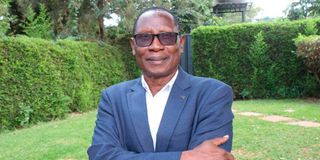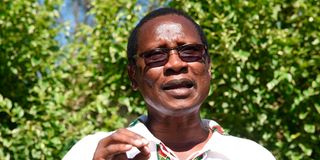
Prof Egara Kabaji during an interview with the Daily Nation on June 23, 2025.
Prof Egara Kabaji is a household name in academic circles. Recently, he was appointed the first chancellor of Mt Kigali University, Rwanda. He spoke to the Daily Nation about his career and higher education.
Congratulations on your recent appointment.
Thank you.
How long have you taught at university?
I have taught at university level for 35 years and have seen it all. I started teaching at Kenyatta University when I was recruited as a graduate assistant in 1990.
How many universities have you taught?
There were staffing problems in Kenyan universities in the 1990s. While at Kenyatta University, I was requested by the University of Nairobi (UoN) to teach at the Department of Literature. The department needed a lecturer to teach oral literature.
The Catholic University of Eastern Africa, which was just starting, also asked me to teach there on part-time basis.
I left Kenya for Rwanda in 2001. The country was establishing a university to train teachers. I taught at Kigali Institute of Education for two years. Many Kenyans were in Rwanda to support the country. It was after the 1994 genocide and the country needed a lot of support.
I was there with my boss, Prof Francis Imbuga, who was the dean of the Faculty of Arts at Kigali Institute of Education.
On returning to Kenya, I taught at Moi University for two years. Moi University was midwifing Masinde Muliro University of Science and Technology in Kakamega, which was then known as Western University College of Science and Technology.
When Masinde Muliro University of Science and Technology (MMUST) became independent, I applied for a job and was hired as a senior lecturer. I then got Fulbright Fellowship to teach in Pennsylvania, the United States, for six months.
What were you teaching?
I taught African literature and courses in writing. I’ve also taught at Kabale University in Uganda under the auspices of the Inter-University Council of East Africa Mobility Programme. It supports lecturers and professors to visit other universities in the region.
How long were you in Uganda?
It was a brief visit for a semester. I have taught at Daystar University as a visiting professor for a year. I have been to the University of Eldoret as a visiting professor too. I think these institutions know what I am capable of. That is why they give me the assignments. I am versatile.
Had you been involved in administration before this appointment?
I have founded several institutions of higher learning. I was one of the first lecturers seconded from Moi University to MMUST, where I founded the Department of Journalism and Mass Communication. My doctorate is in folk media. I drew the programme for the department. At that time, only Daystar University offered Journalism and Mass Communication as degree programmes. The UoN offered post-graduate diploma in journalism. In a sense, MMUST was the first public university to offer a bachelor’s degree in Journalism and Mass Communication.
To build the programme, we empowered the students in first and second year with language skills, history, literature and so on. They were taught the basics of communication. My team and I crafted the programme in such a way that the student was first empowered. The other things were taught in their third year of study.
Were you an administrator in these universities?
I was the founding principal of Turkana University College in 2017. We established the necessary infrastructure and tools, the basics and paperwork. All that was done in two years.
Then why didn’t you remain there?
When I was seconded to Turkana, I was still the MMUST Deputy Vice-Chancellor (Planning Research and Innovation). I went back to complete my term as DVC.
What is memorable about your stay in Turkana?
It is at Turkana University College that I came face-to-face with the reality of why institutions of higher learning collapse and why they incur huge debts.
What did you discover as MMUST Deputy VC?
I was Chief Executive Officer – a CEO charged with the responsibility of taking care of the university resources. The CEO is actually the accounting officer. That was the time I faced the reality of being a public university CEO. They do not talk much about it but I can spill the beans. The biggest challenge a public faces today is its council.
How can managers be the biggest challenge facing universities?
It is problematic to appoint rent-seekers as members of a university council. Some councils have an insatiable appetite for meetings. I wrote to the Ministry of Education to “come and protect me from the thugs”. It is almost impossible to deal with some councils. It’s messy.
Explain please.
We allocated Sh11 million to the council for its meetings and work. I did not go to Turkana County to make money. I went there to make a contribution to society. The budget was drawn clearly. This was a small university. The council had gobbled the Sh11 million in the first six months. The members then demanded that I vire money. I told them there was no virement at Turkana University College.

Prof Egara Kabaji was recently appointed the first chancellor of Mt Kigali University, Rwanda.
Procurement procedures and the Finance Management Act allowed 10 per cent – just about Sh1 million. I could not mismanage public resources. I left the university after two years with zero debts and Sh35 million in its bank account. Workers were paid for four months without Exchequer support.
How possible was that?
It is the prudent use of resources. A soda, for instance, can be bought at Sh40. It can also be bought at Sh200. That depends on how one chooses to spend the money. The concept of mali ya umma (public property) is a huge problem in this country. People imagine the money will never be exhausted. When my time as the DVC Planning, Research and Innovation at MMUST came to an end in 2019, we had zero debts.
Is it the case today?
Thank God, MMUST still pays its employees on time. I pay tribute to those who came after us. Our debts are not as high as what we have been informed about other universities. MMUST is stable, paying employees on the last weekend of the month.
Other than the brush with the council, what else did you learn?
Resources must be managed prudently. Some funds need to be ringfenced. When there is money for teaching practice, it is protected. You can’t use it for something else as students have paid the amount for that purpose.
And?
We need to live within our means. Some excesses in our public universities must be done away. The laissez-faire attitude also needs to be addressed. That is the difference between public and private universities. Workers at a private university know they must treat students with dignity. The employees know that if they do not do that, the university won’t attract students and they will have no jobs.
In many public universities, lecturers take students for granted. There have been cases of students missing lessons because a lecturer has gone to class only three times in a semester and given an exam. This is public knowledge. Such an attitude and practices drive students from public universities. Private institutions have streamlined their operations.
What do you say about cases of students missing marks?
There are cases of lecturers in public universities not doing their work, contributing to this menace. Some students also fail to study or attend lectures then lie to their parents and guardians about missing marks. The problem of missing marks can be solved with the use of technology.
MMUST has done that. Students’ marks are uploaded on the system, which also shows gaps. The system can easily tell if one failed to sit a test.
Automation is key. We also need to establish a relationship with the parents of our students. We need to file reports to them as they pay the fees. Universities have no option but to create a link with parents and guardians. The students are on scholarship by their parents and the provider of the scholarship needs that information.
As programme leader in the Department of Journalism and Mass Communication at MMUST, how are you tackling the problem?
If I realise there are missing marks, I’m answerable to MMUST Senate. I will definitely demand answers from my staff.
What do the programme leader do?
Every programme has a leader as per the Commission of University Education (CUE) requirements. I have been a programme leader at the University of Eldoret as there was no person there for the role. The University of Eldoret needed to satisfy the CUE requirement.
Let’s switch to Rwanda. Is the appointment like going back for you?
I am the chancellor of Mt Kigali University, not the VC. The chancellor is the titular head of a university. I’m happy the institution has given me other responsibilities apart from being a titular head.
What responsibilities?
I am expected to do a number of things. I’m not the traditional chancellor who only appears during graduation. I’m supposed to play an ambassadorial role promoting the values, mission, quality assurance and academic excellence of Mt Kigali University.
I also need to foster relationships with government, academic and community organisations with the intent of upholding the public image and reputation of the university. I will represent the university in public national and international events.
I am acting as an adviser to the university governing body and VC. My duties include observing things and trends in the world and see how we can reposition this university. The objective is to have an Ivy League university in East Africa.
I will also play the lead role in advocacy and representing the university to potential donors, partners alumni, fundraisers and linking it to key stakeholders. With consultations, we will keep inspecting the university to ensure high standards are maintained.
How will that be will that be achieved?
Mt Kigali University has state-of-the-art facilities. It has invested a lot in these facilities. It is in order for the equipment to be used to help the country reposition itself academically. The idea is to work with colleagues to build a university that East Africans will be proud of.
What is the student number?
Mt Kigali University has 9,000 students. Remember, it is still a new university. To position itself as an Ivy League university, there is a cap on the number of learners. You don’t bring in students for the sake of numbers.
What does the capping mean?
If, for example, you’re in dentistry, you only get the number of students your infrastructure can support. The problem with many universities in this region is that we admit students, then create a tent for learning.
The Rwandan government is vigilant and strict when it comes to regulation. What we do in Kenya at times is immoral. We are only interested in the numbers and money. No class in Harvard has 300 students.
Will the capping raise the entry requirements?
It may not go up but one will have to wait for another year if the applicants are many. Alternatively, the university may have to increase its capacity in terms of infrastructure in order to absorb more students.
Did Prof Kabaji apply for this job?
This is a culmination of a career well-built and developed. One does not need to canvass for a job of this nature. The society has to identify you. It is based on what you have built in your career. It should be noted that I am the only professor of literary communication in Kenya. I have more than 40 creative works, including papers in refereed journals, podcasts and documentaries. It is the society that says, that is the guy we are looking for.
I am the vice-president of the Pan African Writers Association and the chairman of the Writers Association of Kenya. I’m also the patron of Kakamega Book Club.
Egara Kabaji is the first person to write and publish a Maragoli dictionary since God created this world. It took me 10 years of painful research to produce it. I’m also a contributor to the competency-based education. I’m working on a Grade 11 book for theatre and film.
What’s your take on AI and higher education?
One thing that remains constant in the world – change. AI is here to stay. AI is not bad. It is just helping us improve, be faster in our work and more efficient.
We now have to start teaching everyone AI. It means our pedagogical practices must change. Those notes we used to go to class with and read must go. I tell colleagues to move from closed-book to open-book exams. The way we teach and ask questions will change.
Many jobs will disappear but many jobs will also be created using AI. For people in public universities crying that AI will dismiss them, it already has. The teacher’s role now is to engage facts, not to give them because those facts are already there.





